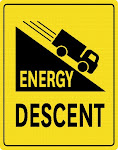 I photographed this ridiculous wall sculpture at the Department of Primary Industries (DPI) in Melbourne a few weeks ago. I was there for a symposium on weeds organised by the Weed Society of Victoria. Two friends of mine were giving papers on the ecological and social benefits of wild, autonomous plants, calling into question our governments' open cheque books to chemical companies who profit from a hyper-ideological ground war on weeds – which, in effect, is a war on our foraging commons.
I photographed this ridiculous wall sculpture at the Department of Primary Industries (DPI) in Melbourne a few weeks ago. I was there for a symposium on weeds organised by the Weed Society of Victoria. Two friends of mine were giving papers on the ecological and social benefits of wild, autonomous plants, calling into question our governments' open cheque books to chemical companies who profit from a hyper-ideological ground war on weeds – which, in effect, is a war on our foraging commons.
It was an intense day with multiple views being aired and argued. It was clear change was in the air, not just because my pro-weed friends and others were invited to participate in a domain that has been a typically pro-war assault from science and government on self-organising floras, but because it is evident that this dumb-arse science isn't working. Katherine Wilson,
writing in Meanjin back in 2009, holds up the mirror:
At the time I was among those campaigning against the Howard government's courting of Monsanto – a company that US courts had found guilty of negligence, trespass, nuisance and suppression of the truth, among other crimes. For its environmental damage, including poisoning of rivers, Monsanto is one of the very few companies found guilty, under Alabama law, of 'outrage' – a conduct 'so outrageous in character and extreme in degree as to go beyond all possible bounds of decency so as to be regarded as atrocious and utterly tolerable in civilized society'.
With
CropLife Australia we don't just have Monsanto advocacy in place to court unconvinced politicians, but Monsanto's brown brothers and sisters too – Dow, Syngenta, Dupont, Bayer, Nufarm etc. Here's a taste of their greenwash:
CropLife Australia promotes a life-cycle, or stewardship, approach to the management of crop protection products. Lifecycle stewardship starts with research and development, and includes manufacture, transport and storage, through to use, and eventual disposal of waste, including empty product containers and the management of unused and unwanted registered products. Our stewardship programs raise awareness and enhance the capability of farm chemical distributors and users to manage any risk posed by these products to people, the environment or trade brought about by incorrect transport, storage or use. The overall aim of the stewardship approach is to maximise the benefits, and minimise any risk, from using crop protection products. CropLife, its members and its wholly-owned subsidiary, Agsafe, either collectively or individually undertake a range of activities to ensure that products are developed, sold, used and disposed of appropriately.
The use of life-cycle and stewardship are clever, if you are a moron. But many of us aren't buying the profit-focussed science and there seems to be a bit of a rethink at the moment as government expenditure is requiring contraction. At the end of the weeds symposium the convener asked the room "where do we want to be in thirty years time?" I answered that we will want to hope that CropLife Australia is bankrupt and out of the picture, to which he, a DPI bureaucrat, clammed up with discomfort and mumbled something like "well, we won't go there, will we".
Oh yes siree, many of us will:















